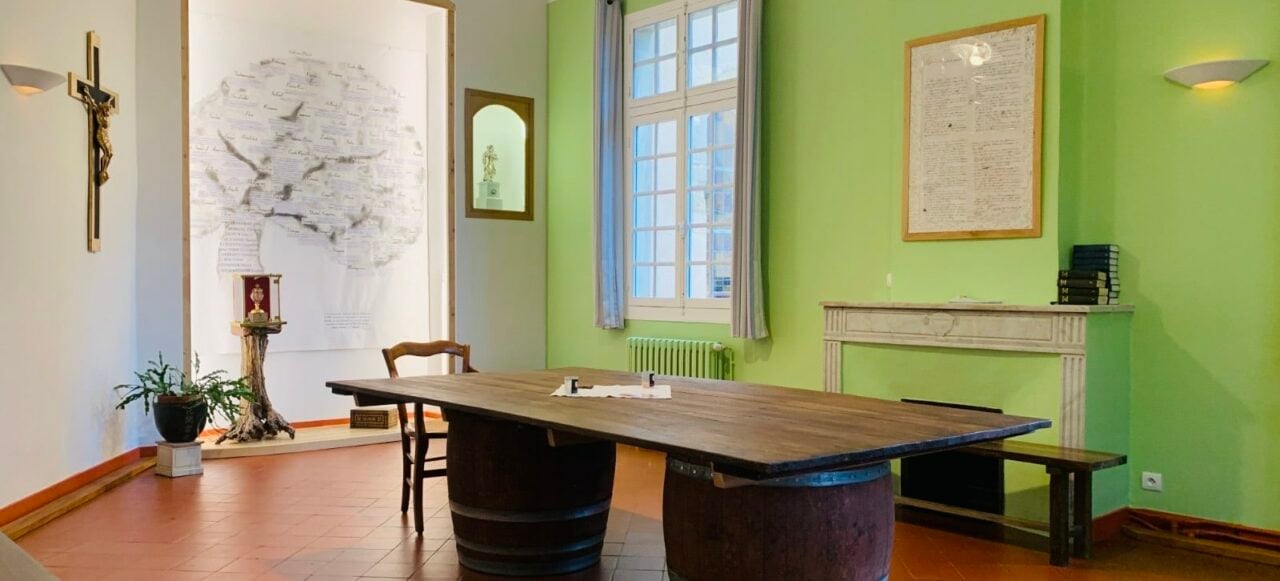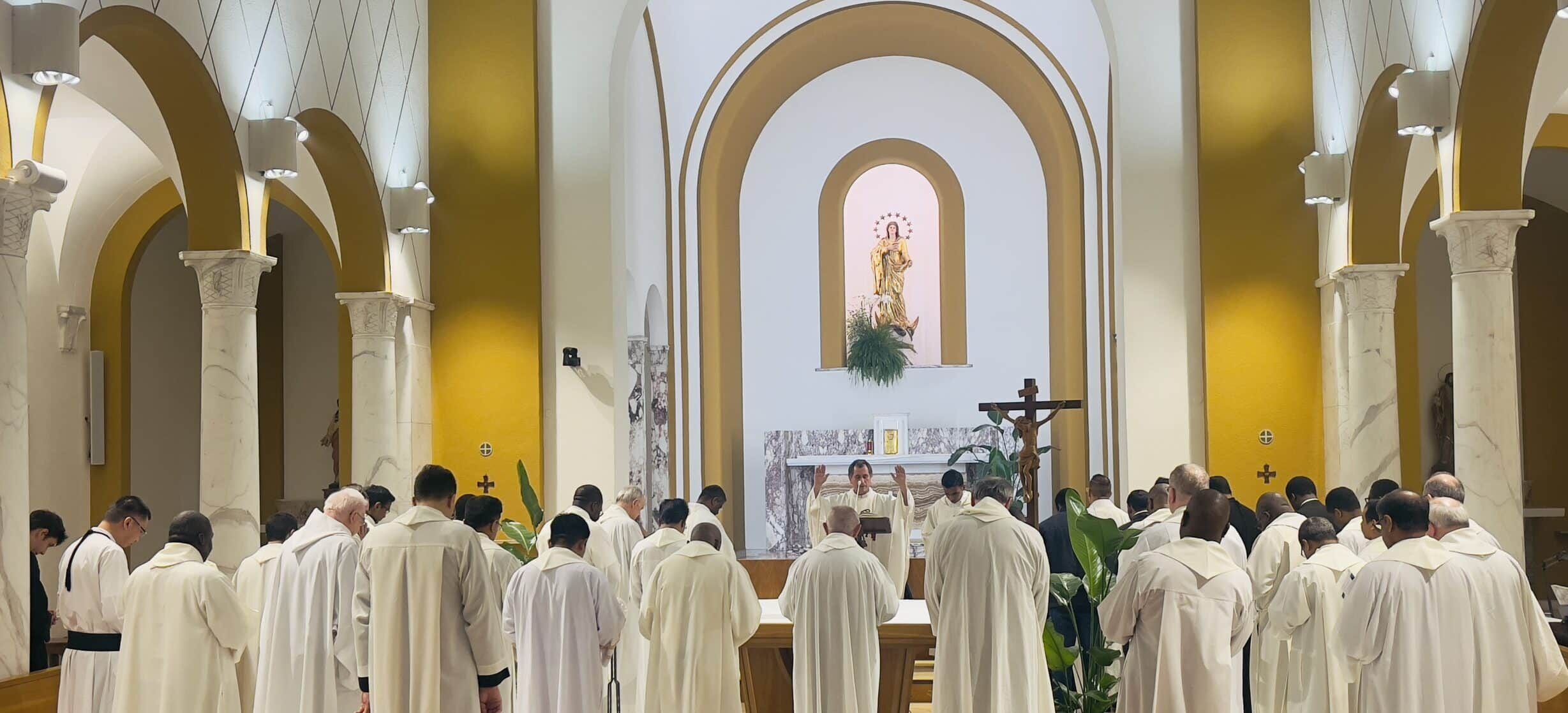Homily, January 25
Dear Brothers and Sisters.
Today we celebrate the Feast of the conversion of St. Paul and we remember the beginning of our community and missionary life 208 years ago. These two events are linked by one word: conversion. St. Paul’s conversion caused him to change his vision of faith, his missionary activity and his membership in a religious community. We can say the same of St. Eugene’s conversion which led him to become a lover of Jesus Christ, a missionary to the poor and the founder of a Congregation in the Church. With Paul and Eugene I invite you to think about our own conversion.
1.- Both Paul and Eugene change the direction of their lives after encounter Jesus. Both live in a critical time like ours, a change of epoch. To Paul, Jesus appears so luminous that he blinds him to all his religious and social convictions. The Pharisee ideology conditioned his religious and social vision, but the encounter with Jesus made him change radically: he went from being a persecutor to being a follower of Jesus. He said “it is not I who live in me, it is Christ who lives in me” (Gal 2:20). Eugene, too, encountering Jesus crucified, changes the direction of his life: the noble De Mazenod stop seeking his social and family success to put himself at the service of an abandoned Church and to be the priest of the poor. Today too, we are tempted to live our faith as an ideology that justifies our political, social and even religious convictions. What do Paul and Eugene teach us today?
Paul and Eugene teach us that Christ must be at the center of our lives, of our thoughts, of our feelings, etc. With strong emotion I ask myself and I ask you: Is Christ really at the center of our lives? Is he at the center of our way of thinking, of feeling, of acting? Is he at the center of our religion? If so, we would fulfil the dream of Paul and the Founder to be another Christ on earth, knowing him more deeply, reproducing him in our lives, letting him live in us. Once again, is Christ really at the center of my life?
2.- For Paul and Eugene meeting Christ also meant receiving a mission. Paul was to be the Apostle to the Gentiles, always travelling, always trying to reach the ends of the earth to proclaim the Gospel of Jesus. Eugene, while wanting to embrace the whole earth, will dedicate himself to the most abandoned in his native region. As a bishop he teaches us that we must always seek out those whom the proclamation of the Gospel has not yet reached and who may be living close to us. Paul and Eugene teach us that our mission is to be always on the move, seeking out the most abandoned, trying everything to proclaim the Gospel to the poorest. They teach us to listen to the cries of the poor and the cries of the Church, the cries also of our Mother Earth. We say that we are missionaries and that everything we do is mission-oriented. I ask myself and I ask you: are the needs of salvation and liberation of the poor really at the center of our activities, of our present and future plans? I ask myself and I ask you: Are the poor really at the center of our mission?
3.- In meeting Christ, Paul discovers his presence in the community of his followers: even at the risk of losing his life, he will be the creator of new communities. Eugene, out of love for Christ and his Church, also feels the call to be the father of a new religious community which in turn will engender new Christian communities. In Paul’s community and in that of St. Eugene, Christ is at the center, generating a missionary communion that makes the Gospel lived and proclaimed. Paul and Eugene know that charity is the expression of missionary communion where the Trinitarian life itself is present.
As we recall the beginnings of the first community in Aix, we remember its first steps, lived in humility and poverty. How was it possible for this small group to survive so many difficulties? The secret is that they learned to love one another. The desire to be another Christ made them learn to love the other as Christ loves them. That is why they helped each other to become more and more holy. We repeat many times the words of what we consider the testament of St. Eugene: charity and zeal, missionary communion among yourselves. It is said in our Constitutions that to persevere we must help the other to attain joy and fulfilment in his vocation and mission. I ask myself and I ask you: Am I striving to help my brothers in community to find joy and fulfilment in their vocation and mission? Are the brothers in community at the center of my human relationships?
Dear Brothers and Sisters. We go on pilgrimage with hope in communion in these times that present us with shocking challenges: wars, injustices, the degradation of the planet, divisions, abuses of all kinds, etc. do not leave us indifferent. Difficult times, a change of epoch. Today the liturgy and our family memories invite us to open ourselves to conversion as a response to these challenges. Let us allow the Spirit of Jesus to transform us and teach us to respond with audacity and with our lives: is Christ really at the center of our lives? are the poor at the center of our mission? are the brothers and sisters in community at the center of my relationships?
May Mary Immaculate, St. Eugene and our Blessed Oblates intercede for us so that we may give a response similar to theirs and help us to continue our pilgrimage until we meet them in heaven. Amen.
Luis Ignacio ALONSO ROIS, OMI
Superior General
Homily, January 25, 2024


